Unit 4 I used to be afraid of the dark Section A(1a-3c)课件+音频(共87张PPT)九年级全册英语教学同步精美课件(人教版)
文档属性
| 名称 | Unit 4 I used to be afraid of the dark Section A(1a-3c)课件+音频(共87张PPT)九年级全册英语教学同步精美课件(人教版) |
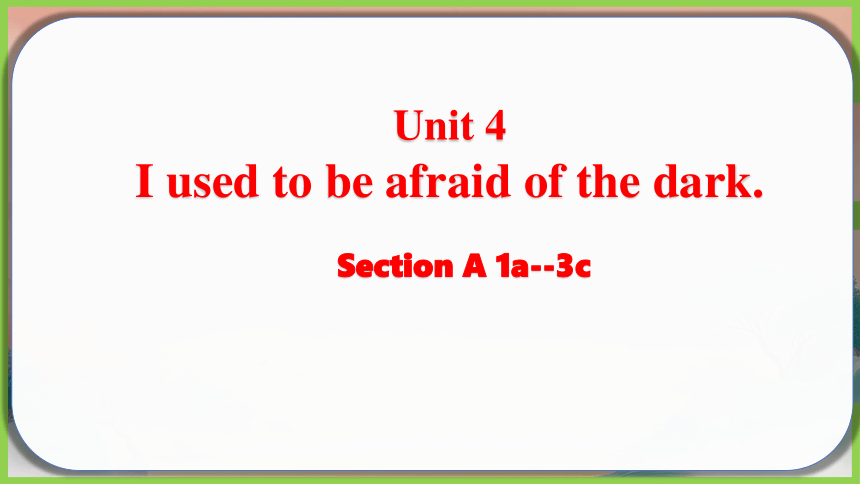
|
|
| 格式 | pptx | ||
| 文件大小 | 14.4MB | ||
| 资源类型 | 教案 | ||
| 版本资源 | 人教新目标(Go for it)版 | ||
| 科目 | 英语 | ||
| 更新时间 | 2025-07-07 00:00:00 | ||
图片预览

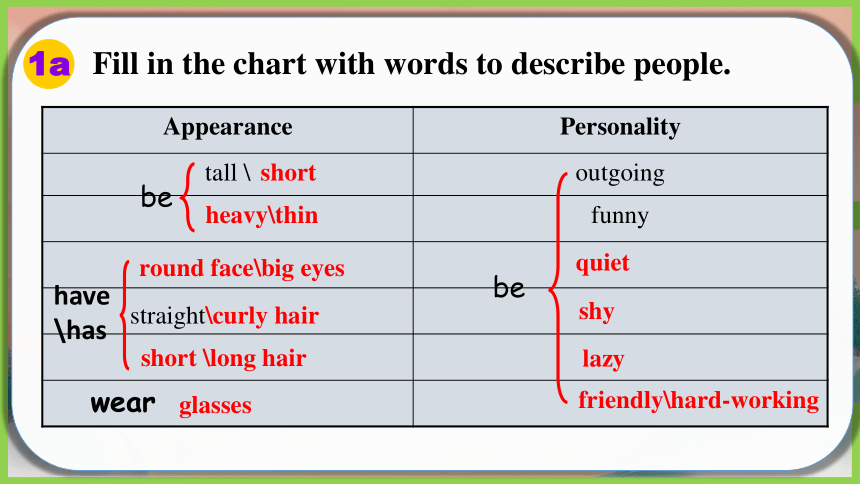
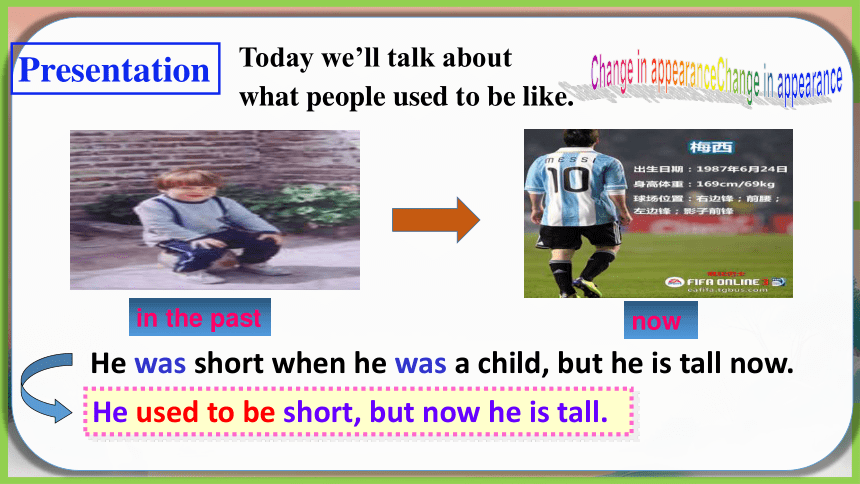
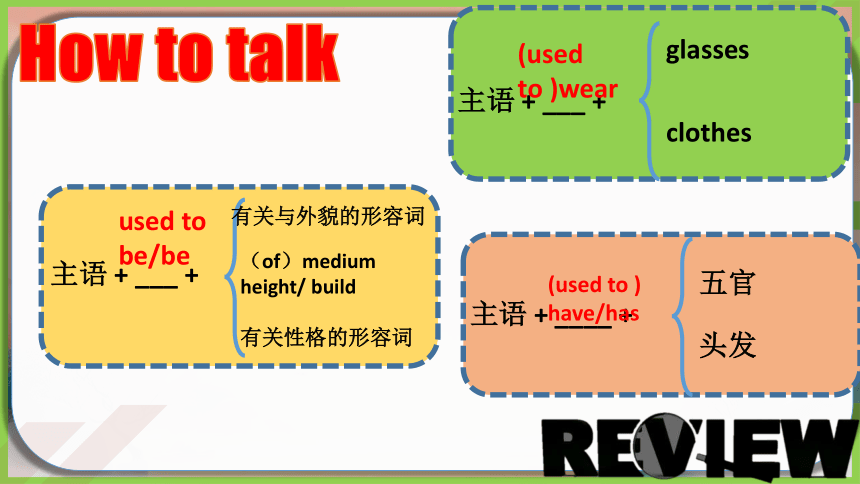
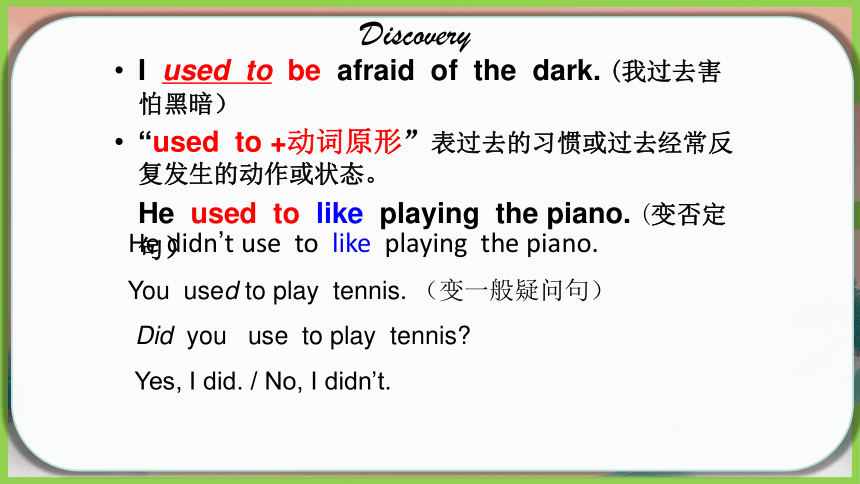
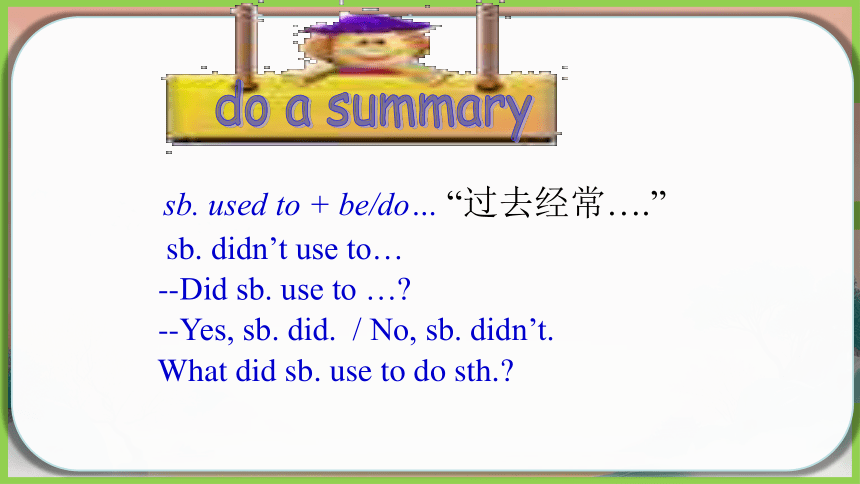
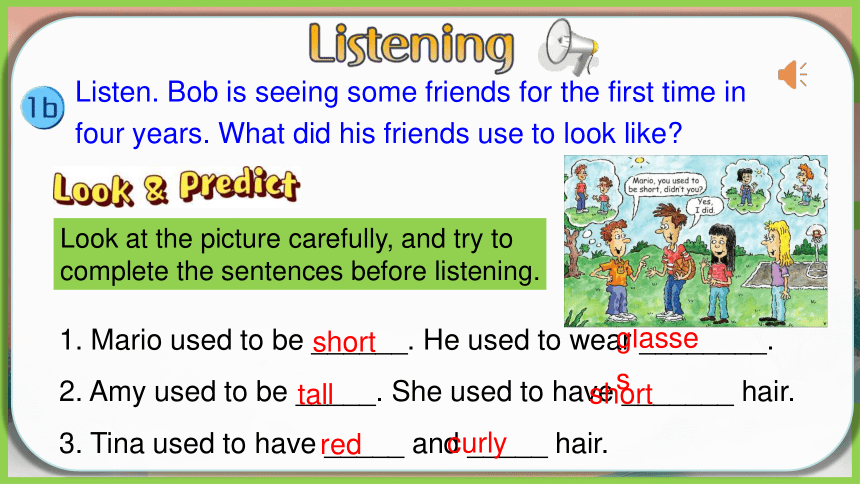
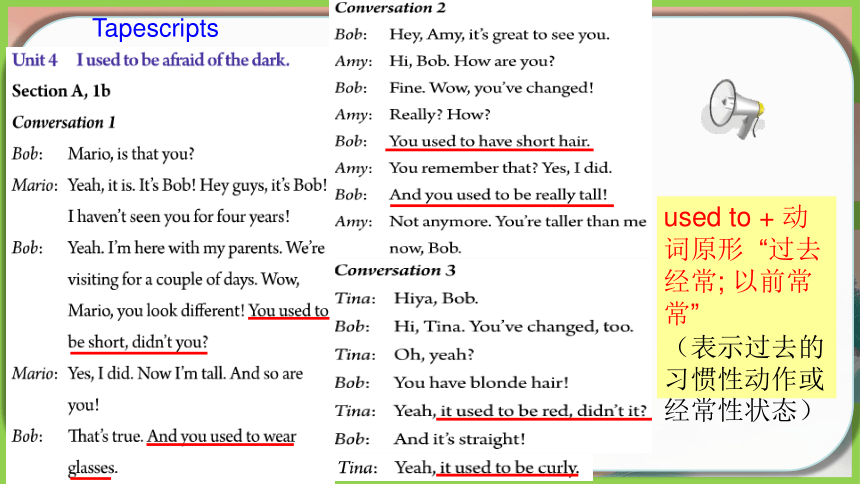
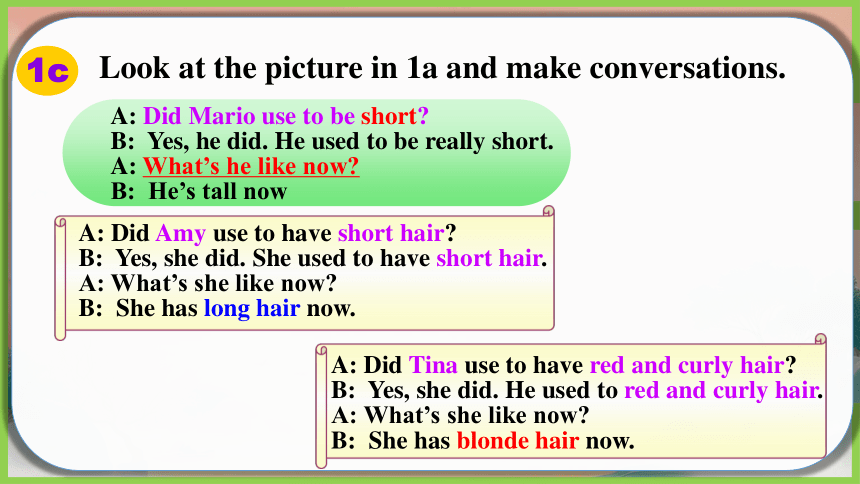
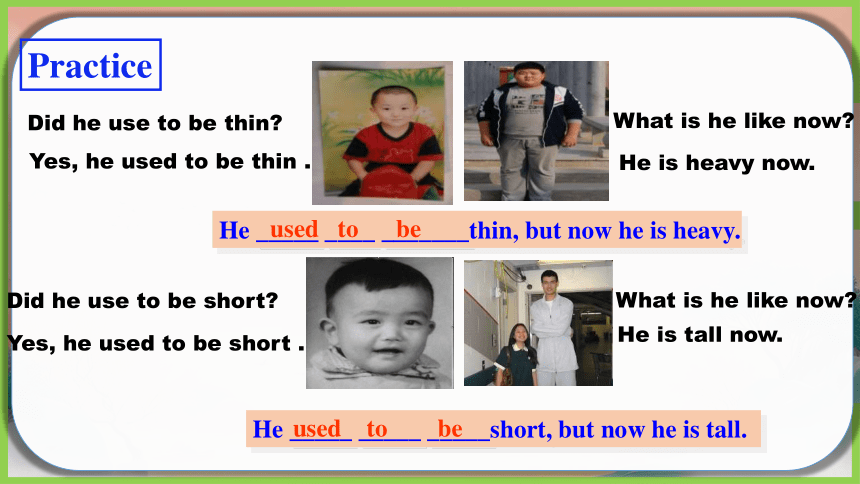
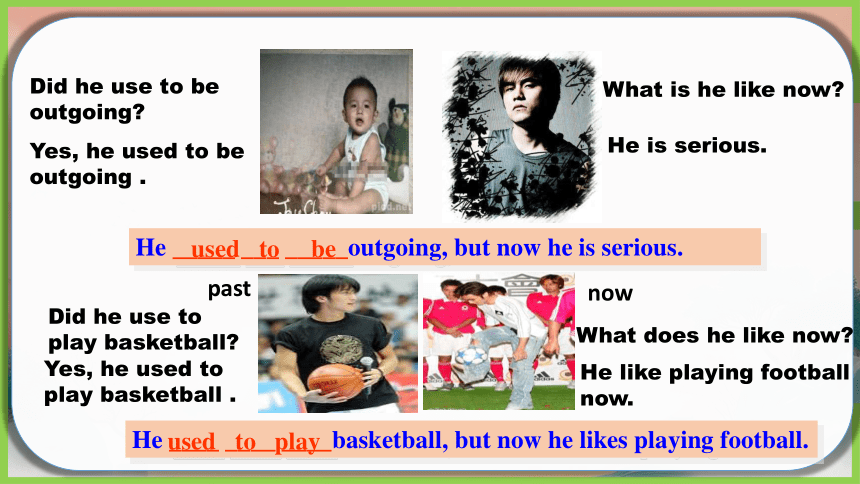
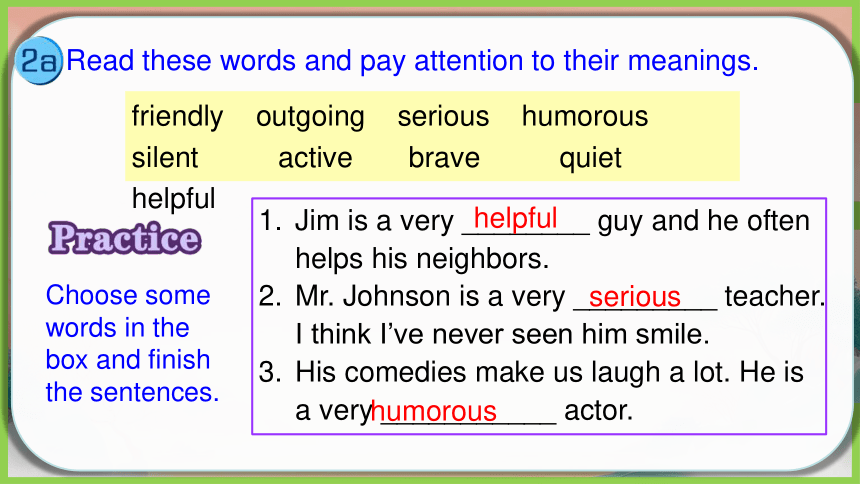
文档简介
(共87张PPT)
Unit 4
I used to be afraid of the dark.
Section A 1a--3c
Fill in the chart with words to describe people.
Appearance Personality
tall \ outgoing
funny
straight\curly hair
short \long hair
glasses
quiet
shy
lazy
friendly\hard-working
heavy\thin
round face\big eyes
be
have
\has
wear
be
short
1a
He used to be short, but now he is tall.
He was short when he was a child, but he is tall now.
now
in the past
Change in appearanceChange in appearance
Presentation
Today we’ll talk about
what people used to be like.
How to talk
主语 + ___ +
有关与外貌的形容词
(of)medium height/ build
有关性格的形容词
used to be/be
主语 + ___ +
glasses
clothes
(used to )wear
主语 + ____ +
五官
头发
(used to ) have/has
I used to be afraid of the dark. (我过去害怕黑暗)
“used to +动词原形”表过去的习惯或过去经常反复发生的动作或状态。
He used to like playing the piano. (变否定句)
He didn’t use to like playing the piano.
You used to play tennis. (变一般疑问句)
Did you use to play tennis
Yes, I did. / No, I didn’t.
Discovery
do a summary
sb. used to + be/do… “过去经常….”
sb. didn’t use to…
--Did sb. use to …
--Yes, sb. did. / No, sb. didn’t.
What did sb. use to do sth.
Listen. Bob is seeing some friends for the first time in four years. What did his friends use to look like
1. Mario used to be ______. He used to wear ________.
2. Amy used to be _____. She used to have _______ hair.
3. Tina used to have _____ and _____ hair.
short
glasses
tall
short
red
curly
Look at the picture carefully, and try to complete the sentences before listening.
Tapescripts
used to + 动词原形 “过去经常; 以前常常”
(表示过去的习惯性动作或经常性状态)
Look at the picture in 1a and make conversations.
A: Did Mario use to be short
B: Yes, he did. He used to be really short.
A: What’s he like now
B: He’s tall now
1c
A: Did Amy use to have short hair
B: Yes, she did. She used to have short hair.
A: What’s she like now
B: She has long hair now.
A: Did Tina use to have red and curly hair
B: Yes, she did. He used to red and curly hair.
A: What’s she like now
B: She has blonde hair now.
Did he use to be thin
He _____ ____ _______thin, but now he is heavy.
He is heavy now.
Yes, he used to be thin .
What is he like now
Practice
Did he use to be short
Yes, he used to be short .
What is he like now
He is tall now.
He _____ _____ _____short, but now he is tall.
used to be
used to be
He _____ ___ _____outgoing, but now he is serious.
Did he use to be
outgoing
Yes, he used to be
outgoing .
What is he like now
He is serious.
past
now
Did he use to
play basketball
Yes, he used to
play basketball .
What does he like now
He like playing football
now.
He ____ ____ ____basketball, but now he likes playing football.
used to play
used to be
Read these words and pay attention to their meanings.
friendly outgoing serious humorous silent active brave quiet helpful
Jim is a very ________ guy and he often helps his neighbors.
Mr. Johnson is a very _________ teacher. I think I’ve never seen him smile.
His comedies make us laugh a lot. He is a very ___________ actor.
helpful
serious
humorous
Choose some words in the box and finish the sentences.
Listen and check (√) the words you hear.
___ friendly ___ outgoing ___ serious
___ humorous ___ silent ___ active
___ brave ___ quiet ___ helpful
Observe the form.
What do we know about Paula in the past and Paula now
Was she good at schoolwork in the past
Did she like music in the past
Does she often do any sports now
Has she said goodbye to music now
How do we know all these things
Listen again and complete the sentences about how Paula has changed.
In the past Now
1. Paula used to be really _______. She was always silent in class. She wasn’t very _________. She was never brave enough to ask questions. 2. She got good grades in _______. She was also good in _______. She used to play the ________. 1. Now she’s more interested in _______. She plays _______ almost every day. She’s also on a ______ team.
2. She still plays the _______ from time to time.
outgoing
quiet
science
music
piano
soccer
sports
swim
piano
Paula used to be really quiet.
Make conversations about Paula using the information in 2b.
I know. She was always silent in class.
2c
She wasn’t very outgoing. She was never brave enough to ask questions.
But she was always friendly. She got good grades in exams. And she was really good in music class, too. She used to play the piano.
But now she is more interest in sports. She plays soccer almost every day. She still plays the piano from time to time.
I know, She’s so active now.
Have you been to a classmate party
How are your classmates
04
Reading
Read 2d and answer the question.
1. What are they doing
2.What’s the relationship between Alfred and Gina
3. How long have Gina and Alfred parted(分离)
4. What are they talking about
5. Is Billy popular now
They are talking about Billy’s changes.
Primary school classmates.
Billy
They are having a party.
For three years.
Yes, he is.
2d
What was Billy like in the past? What is Billy like now?
1.He used to be shy and quiet.
2.He used to read in the library.
4.He used to wear glasses.
5.He used to be thin.
He is so popular now.
3.He studied hard and got good scores on his exams
He is big and strong.
He doesn’t wear glasses.
①n.得分
②v.进球
√
Listen again and fill in the chart.
Billy has changed so much!
2d
Alfred: This party is such a great idea!
Gina: I agree. It’s been three years since we last saw our primary school classmates.
Alfred: It’s interesting to see how people have changed.
Gina: Billy has changed so much! He used to be so shy and quiet.
Alfred: Yeah, his face always turned red when he talked to girls!
Gina: I used to see him reading in the library every day.
Alfred: That’s because he was a really good student. He studied hard and got good scores on his exams.
Gina: Did he use to wear glasses
Alfred: Yes, and he used to be thin, too. But look how big and strong he is now!
Gina: He’s so popular now. Look at all the girls around him!
2d Role-play the conversation.
根据2d对话,补全下列短文。
In the party Alfred met Gina. It_____ _____ three years since they last _____ their primary school classmates. They were talking about their friend, Billy. Billy _____ _________ so much. He _____ _____ ____ shy and _______. His face always _______ ______ when he talked to girls.
Gina used to_____ him ______ in the library every day. Billy studied hard and ______ ______ _____ ______ his exams. Billy used to _____ glasses, and he also used to ______ ______, but now he is ______and ______. He is also very ________, because many girls are around him.
has been
saw
has changed
used to
strong
quiet
turned red
see
reading
got good scores on
wear
be thin
big
be
popular
Make a survey in your class about who has changed most. Then make a report.
Past Now
Hair
Height
Build
Personality
Hobby
We found … has changed most. He / She used to …, but now he / she …
Give a report like this:
Hello, everyone. Tom is my friend . He used to be..., but now he is.... He used to have..., but now he has... He used to play / like..., but now he plays / likes...now. Lucy used to have…People sure change a lot.
Groupwork
People Sure Change!
Talk about how you have changed.
1. What did you use to look like
2. What did you use to be like
3. What did you use to like doing
Sample
I used to be short and thin, but now I am tall
and strong. I used to be shy and quiet, but now I
am outgoing. I used to like playing soccer, but now
I like basketball more.
Writing
China used to be poor and backward(落后).
Discussion
What did China use to be like
不忘初心 砥砺前行
04
Summary
have straight /curly hair
be silent in class
be interested in
on a basketball team
from time to time
turn red
get good scores on the exam
wear glasses
留着直发/卷发
在课堂上保持沉默
对……感兴趣
在篮球队
时常;有时
变红
在考试中取得好成绩
戴着眼镜
句型:
1. Did Mario use to be short
2. He used to be really shy.
3. What’s he like now
4. It’s been three years since we last saw our primary school classmates.
5. It’s interesting to see how people have changed.
05
Language
points
1. I used to be afraid of the dark.
used to do sth. 过去常常做某事
*表示过去经常性或习惯性的动作或状态,暗指现在已经不存在了,强调过去与现在的对比。used to 后接动词原形。
*used to的否定形式有两种:
didn’t use to或usedn’t to。
Language points
*used to用于疑问句时,可借助助动词did,也可以将used
提到主语前。
Did you use to… 或者Used you to…
e.g. They used to be good friends. 他们过去是好朋友。 (暗示现在不是了)
Mrs. Brown didn’t use to / usedn’t to travel in summer.
布朗夫人过去夏天不旅游。
Did you use to / Used you to play the guitar 他过去弹吉他吗?
【拓展】几个易混结构的比较:
结构 意义 to的作用
used to do sth. 过去常常做某事 不定式符号
use ... to do sth. 用…做… be used to do sth. 被用来做… be used to doing sth. 习惯于做某事 介词
use ... to do sth.用……做……
e.g. They use the knife to cut meat.他们用刀切肉。
e.g. This kind of wood is used to make paper.
这种木头是被用来做纸的。
be used to do sth. 被用来做某事
be / get used to sth. / doing sth. 习惯于某事 / 做某事
e.g. Lucy has been used to (eating) Chinese food.
Lucy已经习惯(吃)中餐了。
I think you’ll get used to the climate soon.
我想不久你就会习惯这种气候的。
根据所给汉语提示完成英语句子。
1. My uncle __________________(以前是个司机), but now he is an actor.
2. Tom’s father ____________________(过去常常看书) after lunch.
3. Mary __________________(以前常常骑自行车) to work, but now she _________________(习惯步行) to work.
4. The pencil ______________(被用来书写).
used to be a driver
used to read (books)
used to ride a bike
is used to walking
is used to write
from time to time是一个固定短语,意为“间或;有时”,常在句中作状语。
e.g. Tom goes to visit his grandmother in the countryside from time to time. 汤姆时常去看望住在农村的奶奶。
2. She still plays the piano from time to time.
3. He studied hard and got good scores on his exams.
score n. 得分;进球
e.g. He got high scores in the examination.
考试中他得了高分。
4. This party is such a great idea!
He used to be so shy and quiet.
such与so 辨析
such为形容词,意为“这(那)样的;主要修饰名词;
so是副词,意为“这(那)么;如此地”,主要修饰形容词、副词和分词。
e.g. Do you like such weather 你喜欢这样的天气吗?
I’m so glad to see you.很高兴见到你。
He can draw so well.他画得那么好。
当名词前有many,much,few或little等词修饰时,要用so而不用such。
e.g. There are so many / few people in the hall.
大厅有这么多/这么少的人。
You have so much / little homework today.
你今天有这么多/这么少的作业。
“such + a / an +形容词+可数名词单数形式”相当于“so +形容词+a / an +可数名词单数形式”,表示“如此……的一个……”。
e.g. She is such a lovely girl. = She is so lovely a girl.
她是这个如此可爱的女孩。
选用such或so填空。
1. The man told us ____ funny a story.
2. She has _____ a beautiful dress.
3. How can you get ____ much money to buy the car
4. Don’t go out in ______ cold weather.
5. Don’t eat _____ quickly.
so
such
so
such
so
06
Exercise
Ⅰ. 根据语境及所给首字母提示,补全所缺单词。
1. We won the football game with a s of 4 to 1.
2. Cindy likes telling jokes and we all think she is a h girl.
3. Betty kept s at first, but soon she joined the other girls, talking and laughing.
4. —How h Sally is!
—Yes. She never refuses to help others.
silent / silence
score
humorous
helpful
Ⅱ. 根据汉语意思,完成英语句子,每空一词。
1. 我奶奶过去常常用手洗衣服。
My grandma _______ _______ _______ clothes by hand.
2. 自从我们搬到这座城市以来有四年了。
_______ _______ _______ four years _______ we moved to this city.
3. Paula经常骑自行车去上学,但她有时步行去。
Paula often goes to school by bike, but she walks there _______ _______ _______ _______.
used to wash
It has been since
from time to time
Ⅲ. 根据汉语意思及括号内所给提示语,将下列句子翻译成英语。
1. 杰夫(Jeff)长什么样子? (be like)
2. 你弟弟过去常常打篮球吗? (used to)
3. 和我的数学老师交谈很有趣。 (it; interesting)
What is Jeff like
Did your brother use to play basketball
It’s interesting to talk with my math teacher.
4. 自从格林(Green)一家离开这个镇子已经有10年了。 (it; since)
5. 两年前萨姆(Sam)对拍照感兴趣。 (interested)
6. 暑假安妮(Annie)有时去旅行。 (from time to time)
It has been ten years since the Greens left this town.
Sam was interested in taking photos two years ago.
Annie goes traveling on summer vacation from time to time.
Ⅳ. 根据对话内容,在空白处填入恰当的句子。
A: Hi, Alfred! I haven’t seen you for many years. (1)____________________
B: Oh, I have been to New York. I moved there with my parents. They got jobs there.
A: I’m very glad to see you again. (2)_______________________, haven’t you
B: Yes, I have. (3)________________________. But now I’m very outgoing.
A: That’s true. (4)_________________________
Where have you been
You have changed a lot
I used to be very shy/quiet
Did you use to like music
He used to be____,to deal with his_______,
He took up __________after finishing college.
But now he is ____________ .
He dares to speak___________________.
has changed
in the past
shy
shyness
teaching .
not shy any more
in front of crowds
How he has changed
tons of attention
guards around him
He doesn’t have much ______time.
private
私人的
It s a lot of talent and hard work.
need
a small number of
The road to success is so difficult.
require
Only________________ people can be successful.
Look at the title of the passage, discuss the following questions.
Prediction
What did she use to be
Why is the girl in the picture holding a microphone(话筒)
Is she shy or outgoing now
She used to be shy.
Because she is singing.
She is outgoing now.
从害羞女孩到明星
4.Can you guess what this passage is about
A girl’s hobbies.
A girl’s school life.
A girl’s experience(经历).
Tips: We can get some information from the title(题目)and the picture.
___ how Candy’s life has
changed
___ Candy’s advice to
young people
___ Candy’s background
2
3
1
Tips: “Topic sentence”(主题句) is often at the beginning or the end of each paragraph.
3a
Number the information [1-3].
Fast reading
篇章人物背景
主人翁生活的变化
主人翁给读者带来的经验或启迪
本文描述了一个性格腼腆的小姑娘实现自我完善成为流行歌星的故事,属于人物专访,是典型的叙事性文体。
写作中可以借用这类文体结构进行谋篇布局。
From Shy Girl to Pop Star
For this month’s Young World magazine, I interviewed 19-year-old Asian pop star Candy Wang. Candy told me that she used to be really
shy and took up singing to deal with her shyness. As she got better, she
dared to sing in front of her class, and then for the whole school. Now
she’s not shy anymore and loves singing in front of crowds.
1
take up doing sth.
开始做某事
dare to do sth.
敢于做某事
a crowd of ...
一群……
crowds of ...
成群的……
间接宾语
that 引导的宾语从句,作told的直接宾语
动词不定式短语作目的状语,说明took up singing 的目的
Read para1 carefully and finish the tasks.
Careful reading
Read Para 1 and choose the best answer.
( ) 1. Why did Candy take up singing
A . To show her talent.
B .To deal with her shyness.
C .To take part in singing contest.
( ) 2. As Candy got better ,what did she dare to do
A . she dared to speak in front of her class.
B . she dared to jump from the top of the wall.
C . she dared to sing in front of her class ,
and then the whole school.
take up 从事
deal with处理
dare to do
敢于做…
B
C
Para1
Read Paragraph 1 and answer the questions.
What does Candy do
What did she use to be like
3. How did she deal with her shyness
4. Is she shy now
She is a pop star.
She used to be really shy.
She took up singing to deal with shyness.
No, she isn't.
1
2
3
4
Background
age
finally become
used to be
hometown
Asia
19
pop star
really shy
hobby
take up singing
deal with shyness
love singing
Do you need to change yourself
change herselfchange herself
Read Para 2 and complete the table.
1.She used to be shy.
how Candy’s life has changed
In the past
now
2.She didn’t use to be
popular in school.
3.She used to_______with friends.
4.She didn’t use to
______________how she
appeared to others.
1.She’s not shy anymore.
2.She gets___________.
3.It’s impossible for her to hang out with her friends now.
4.She has to___________ what she says or does.
tons of attention
hang out
worry about
be careful about
Task 3
hang out 闲逛
worry about 担心
额
tons of 大量的
bb
be careful about对…谨慎
额
not .. anymore 不再
I asked Candy how life was different after she became famous. She explained that there are many good things, like being able to travel and meet new people all the time. “I didn’t use to be popular in school, but now I get tons of attention everywhere I go.” However, too much attention can also be a bad thing.
2
Read para2 carefully and finish the tasks.
Careful reading
“I always have to worry about how I appear to others, and I have to be very careful about what I say or do. And I don’t have much private time anymore. Hanging out with friends
is almost impossible for me now because there are always
guards around me.”
单个动名词短语作主语
谓语动词用单数
because 引导的原因状语从句
Please read paragraph 2 and then fill in a chart about how Candy’s life has changed.
Good things Bad things
She is able to
_____________
new people all the
time.
2. She gets
_______________ everywhere she
goes.
She always has to ____________
how she appears to others.
2. She has to________________what
she says or does.
3. She doesn’t have___________
_____________anymore.
4. There are always__________
___________.
travel and meet
tons of attention
worry about
be careful about
private time
much
around her
guards
Para2
life after becoming famous
优势advantages
be able to
no private time
劣势disadvantages
get tons of
worry about
be very careful about
too much attention
give up your normal life
Changes
Do you want to become a pop star
be prepared to do sth.
= be ready to do sth.准备好做某事
sth. require(s) doing 某事需要被做
require sth. 需要某物
require sb. to do sth.需要某人做某事
require + that 从句 需要……
3
What does Candy have to say to all those young people who want to become famous “Well,” she begins slowly, “you have to
be prepared to give up your normal life. You can never imagine
how difficult the road to success is. Many times I thought about giving up, but I fought on. You really require a lot of talent and
hard work to succeed. Only a very small number of people make it to the top.”
Read para3 carefully and finish the tasks.
Careful reading
1.People who are famous can have a normal life all the time.
2.Young people have to be prepared to give up their normal life if they are famous.
3.The road to success may be difficult.
4.Young peole who want to become famous really require a lot of talent and hard work to succeed.
5.A large number of people can make it to the top.
Decide True or False.
Read again and complete the sentences.
Advice to young people:
Young people have to be prepared to ______________________________.
The road to success is so ___________.
They really require _________________________.
Only a small number of people __________________.
give up their normal life
difficult
a lot of talent and hard work
make it to the top
What does the word "require" mean
A. make B. need C. become D. appear
can be successful
advice
never give up
You can never imagine…
You really require a lot of…
Only a small number of …
fight on
talent
hard work
to succeed
You have to be prepared to…
normal life
make it to the top
Advice
You require 99% of hard work and 1% of talent to succeed. ---Edison
From Shy Girl to Pop Star
Candy’s background
How Candy’s life
has changed
Candy’s advice to young people
age and job
used to… and took up…to deal with …
now , … not shy…
and loves …
didn’t use to be popular…
…hang out with…
didn’t use to worry about…
in the past
now
gets tons of attention
it’s impossible for…to hang out…
has to be careful about…
be prepared to…
the road to success is…
require … and …
to succeed
only a small
number of …
Retelling
Task 5
思维导图
require lots of hard work
deal with lots of problems
fight on and I believe I can make it
get tons of attention
be careful about what I say or do
dare to speak in front of crowds
=need
be successful
be brave enough to
be ready to
the road to be a good teacher
I’m prepared to be successful
The road to succeed
A research shows that…
People who have clear,
long dreams
finally will become social elites(社会精英).
Do you have a dream
Please make a goal,and work hard for it!
Please open your mouth,speak English loudly!
Please use your pen, write out your ideas!
Maybe you will have difficulties and failure,
but go on, please!
Believe yourself! You will succeed!
你有一个梦想吗?
请制定一个目标,并为此而努力!
请张开你的嘴,大声地说英语!
请用你的笔,写出你心中所想!
也许你会遭遇困难和失败,但请继续!
相信自己!你一定会成功!
Your life does not get better by chance,
it gets better by change. -Jim Rohn
No pains, no gains.
一分耕耘,一分收获。
Where there is a will,there is a way.
有志者事竟成。
Believe in yourself and keep on doing it
Nothing is difficult if you are brave or careful enough.N
04
Language
points
Language points
I interviewed 19-year-old Asian pop star ...
interview在此处作动词,意为“采访;面试”。interview也可作名词,意为“面试;访谈”。
Asian 在此处作形容词,意为“亚洲的”。除此之外,Asian作形容词还可意为“亚洲人的”。Asian还可作可数名词,意为“亚洲人”。
【活学活用】1) 我们正在采访艺术节的学生。 ______________________________________
2) 有多少个亚洲国家参加了运动会?
______________________________________
We are interviewing some students for the coming art festival.
How many Asian countries have taken part in the sports meeting
Candy told me that she used to be really shy and took up singing to deal with her shyness.
take up 开始;从事;接纳;占据;继续做
take up doing sth. 开始干某事
deal with 意为“对付;处理, 常与how连用, 强调处理问题的方式、方法。do with常与 what 连用, 侧重于对某事物的利用。
【活学活用】1) 他辞去城里的工作,开始务农。 ______________________________________
2) 我不知道他们如何处理这个问题。
______________________________________
He left the job in the city to take up farming.
I don’t know how they deal with the problem.
= I don’t know what they do with the problem.
deal with 此外还有“讨论; 与…交易”的意思。
I have a matter of importance to deal with.我有要事要处理。
Have you got any good idea about how to deal with this difficulty
处理这种困难你有什么好想法吗?
When I worked in Florida, I dealt with British people all the time.
在佛罗里达工作时, 我一直与英国人有生意往来。
【活学活用】
— ________ did you ________ your pocket money
— I sent it to the children in Sichuan.
A. What; deal with B. How; do to
C. What; deal to D. How; deal with
D
As she got better, she dared to sing in front of her class, and then for the whole school.
dare dare用作实义动词时,有时态和人称的变化,用do、does或did来构成否定句或疑问句。此处用作及物动词,意为“敢于;胆敢”。常构成短语dare to do sth. 意为“敢于做某事”。
whole 形容词,意为“整个的;全部的”,常用结“the+whole+单数名词”。all也有此意,all用于冠词、所有格或其他限定词之前;whole用于冠词、所有格及其他限定词之后
【活学活用】1) 他不敢正眼看她。 ______________________________________
2) 我的一生 ______________________________________
He didn't dare to look at her in the eye.
all my life/my whole life
dare用作情态动词, 一般用于疑问句、否定句或条件句, 或与 hardly, never, no one, nobody 等连用。有时态变化,但没有人称形式的变化, 其后接动词原形。构成疑问句和否定句时不用助动词do
I don't know whether he dare try.
我不知道他是否敢试一试。
How dare you ask me such a question
你怎敢问我这样的问题
【活学活用】
I _______ you because I thought I must be wrong.
A. dare not ask B. dare not to ask
C. dare not asking D. dare to not ask
A
“Well,” she begins slowly, “you have to be prepared to give up your normal life.
prepare 在此处用作及物动词,意为“准备;预备”。 常用搭配:
prepare sth. “准备某物”。
prepare sb sth. 表示“给某人准备某物”也可用prepare sth for sb.
prepare sb. for sth 表示“使某人对所准备”
prepare to do sth. 表示“准备做某事”。
【活学活用】1) 她给我们准备了可口的早餐。______________________________________
2) 他们正准备过河,这时突然下雨了。______________________________________
She prepared us a nice breakfast.
= She prepared a nice breakfast for us.
They were preparing to cross the river when it began to rain.
give up意为“放弃”, 后面可以接名词或动词-ing形式作宾语。
give up是动副短语, 如果宾语是名词, 既可以将其放在give与up的中间, 也可以放在give up的后面。如果宾语是代词, 则必须将其放在give与up之间。
I wish I could give up drinking. 我真希望自己能戒酒。
We won’t give up this project. = We won’t give this project up.
我们不会放弃这项工程。
Don’t give him up.不要放弃他。
【活学活用】
You should really ______ smoking. It's a terrible habit.
A. grow up B. pick up
C. give up D. set up
C
… because there are always guards around me.
guard在此处作可数名词,意为“警卫;看守”。the Guards指(英国和其他一些国家的)禁军,御林军,近卫军。
guard还可作及物动词,意为“守卫,保卫”。guard against sth. “防止/防范/提防某事”。
【活学活用】1) 他在一家公司做安保。______________________________________
2) 每天刷牙提防口腔疾病。______________________________________
He works as a security guard in a company.
Brush your teeth every day to guard against tooth diseases.
05
Summary
19岁的亚洲明星
开始唱歌
处理
敢于做某事
备受关注
担忧
为…而做好准备
总是
19-year-old Asian star
take up singing
deal with
dare to do sth
tons of attention
worry about
be prepared to
all the time
Phrases summary
不再
放弃
通往成功的路
要求很多耐心和努力去成功
小部分人
继续奋斗
小心…
一些私人时间
到达顶峰
not …anymore
give up(doing sth)
the road to success
require a lot of talent and hard work to succeed
a small number of people
fight on
be careful about..
much private time
make it to the top
05
Exercise
Ⅰ. 根据语境及所给首字母提示,补全所缺单词。
1. It’s impolite to talk about others’ p lives.
2. Those two g didn’t allow us into the building.
3. My pet dog doesn’t feel well. It r a lot of care and attention.
4. They’re from different countries, so they have different cultural b .
private / personal
guards
requires
background(s)
Ⅱ. 根据汉语意思,完成英语句子,每空一词。
1. 你小时候敢爬树吗?
_______ you _______ _______ _______ the tree when you were young
2. Billy不知道如何处理这些无聊的问题。
Billy doesn’t know how _______ _______ _______ these boring problems.
Did dare to climb
to deal with
3. Peter十岁时开始弹吉他。
Peter _______ _______ playing the guitar when he was 10 years old.
4. Paula经常骑自行车去上学,但她有时步行去。
Paula often goes to school by bike, but she walks there _______ _______ _______ _______.
took up
from time to time
比尔 过去 现在
外貌 个子矮,短发 个子高了,长发
爱好 打篮球、看电视、网上聊天 弹钢琴、看书、散步
性格 内向 外向
写作任务
写前指导:
1.人称:第三人称
2.时态:一般现在时和一般过去时
3.结构提纲:1)开篇点题:引出谈论的话题
2)对比陈述:对比比尔过去与现在的不同之处并逐一陈述。
3)得出结论:人一定会变的。
4.语句储备: (1)…has changed a lot in the past few years.
(2) …used to…, but now…
Bill is my good friend. He has changed a lot in the last few years.
Bill used to be short and have short hair, but now he is much taller and has long hair. He used to play basketball a lot. He liked watching TV and often chatted with me on the Internet. But now he plays the piano and he likes reading books. Sometimes he often takes a walk. He used to be silent, but now he is outgoing.
People sure change.
Unit 4
I used to be afraid of the dark.
Section A 1a--3c
Fill in the chart with words to describe people.
Appearance Personality
tall \ outgoing
funny
straight\curly hair
short \long hair
glasses
quiet
shy
lazy
friendly\hard-working
heavy\thin
round face\big eyes
be
have
\has
wear
be
short
1a
He used to be short, but now he is tall.
He was short when he was a child, but he is tall now.
now
in the past
Change in appearanceChange in appearance
Presentation
Today we’ll talk about
what people used to be like.
How to talk
主语 + ___ +
有关与外貌的形容词
(of)medium height/ build
有关性格的形容词
used to be/be
主语 + ___ +
glasses
clothes
(used to )wear
主语 + ____ +
五官
头发
(used to ) have/has
I used to be afraid of the dark. (我过去害怕黑暗)
“used to +动词原形”表过去的习惯或过去经常反复发生的动作或状态。
He used to like playing the piano. (变否定句)
He didn’t use to like playing the piano.
You used to play tennis. (变一般疑问句)
Did you use to play tennis
Yes, I did. / No, I didn’t.
Discovery
do a summary
sb. used to + be/do… “过去经常….”
sb. didn’t use to…
--Did sb. use to …
--Yes, sb. did. / No, sb. didn’t.
What did sb. use to do sth.
Listen. Bob is seeing some friends for the first time in four years. What did his friends use to look like
1. Mario used to be ______. He used to wear ________.
2. Amy used to be _____. She used to have _______ hair.
3. Tina used to have _____ and _____ hair.
short
glasses
tall
short
red
curly
Look at the picture carefully, and try to complete the sentences before listening.
Tapescripts
used to + 动词原形 “过去经常; 以前常常”
(表示过去的习惯性动作或经常性状态)
Look at the picture in 1a and make conversations.
A: Did Mario use to be short
B: Yes, he did. He used to be really short.
A: What’s he like now
B: He’s tall now
1c
A: Did Amy use to have short hair
B: Yes, she did. She used to have short hair.
A: What’s she like now
B: She has long hair now.
A: Did Tina use to have red and curly hair
B: Yes, she did. He used to red and curly hair.
A: What’s she like now
B: She has blonde hair now.
Did he use to be thin
He _____ ____ _______thin, but now he is heavy.
He is heavy now.
Yes, he used to be thin .
What is he like now
Practice
Did he use to be short
Yes, he used to be short .
What is he like now
He is tall now.
He _____ _____ _____short, but now he is tall.
used to be
used to be
He _____ ___ _____outgoing, but now he is serious.
Did he use to be
outgoing
Yes, he used to be
outgoing .
What is he like now
He is serious.
past
now
Did he use to
play basketball
Yes, he used to
play basketball .
What does he like now
He like playing football
now.
He ____ ____ ____basketball, but now he likes playing football.
used to play
used to be
Read these words and pay attention to their meanings.
friendly outgoing serious humorous silent active brave quiet helpful
Jim is a very ________ guy and he often helps his neighbors.
Mr. Johnson is a very _________ teacher. I think I’ve never seen him smile.
His comedies make us laugh a lot. He is a very ___________ actor.
helpful
serious
humorous
Choose some words in the box and finish the sentences.
Listen and check (√) the words you hear.
___ friendly ___ outgoing ___ serious
___ humorous ___ silent ___ active
___ brave ___ quiet ___ helpful
Observe the form.
What do we know about Paula in the past and Paula now
Was she good at schoolwork in the past
Did she like music in the past
Does she often do any sports now
Has she said goodbye to music now
How do we know all these things
Listen again and complete the sentences about how Paula has changed.
In the past Now
1. Paula used to be really _______. She was always silent in class. She wasn’t very _________. She was never brave enough to ask questions. 2. She got good grades in _______. She was also good in _______. She used to play the ________. 1. Now she’s more interested in _______. She plays _______ almost every day. She’s also on a ______ team.
2. She still plays the _______ from time to time.
outgoing
quiet
science
music
piano
soccer
sports
swim
piano
Paula used to be really quiet.
Make conversations about Paula using the information in 2b.
I know. She was always silent in class.
2c
She wasn’t very outgoing. She was never brave enough to ask questions.
But she was always friendly. She got good grades in exams. And she was really good in music class, too. She used to play the piano.
But now she is more interest in sports. She plays soccer almost every day. She still plays the piano from time to time.
I know, She’s so active now.
Have you been to a classmate party
How are your classmates
04
Reading
Read 2d and answer the question.
1. What are they doing
2.What’s the relationship between Alfred and Gina
3. How long have Gina and Alfred parted(分离)
4. What are they talking about
5. Is Billy popular now
They are talking about Billy’s changes.
Primary school classmates.
Billy
They are having a party.
For three years.
Yes, he is.
2d
What was Billy like in the past? What is Billy like now?
1.He used to be shy and quiet.
2.He used to read in the library.
4.He used to wear glasses.
5.He used to be thin.
He is so popular now.
3.He studied hard and got good scores on his exams
He is big and strong.
He doesn’t wear glasses.
①n.得分
②v.进球
√
Listen again and fill in the chart.
Billy has changed so much!
2d
Alfred: This party is such a great idea!
Gina: I agree. It’s been three years since we last saw our primary school classmates.
Alfred: It’s interesting to see how people have changed.
Gina: Billy has changed so much! He used to be so shy and quiet.
Alfred: Yeah, his face always turned red when he talked to girls!
Gina: I used to see him reading in the library every day.
Alfred: That’s because he was a really good student. He studied hard and got good scores on his exams.
Gina: Did he use to wear glasses
Alfred: Yes, and he used to be thin, too. But look how big and strong he is now!
Gina: He’s so popular now. Look at all the girls around him!
2d Role-play the conversation.
根据2d对话,补全下列短文。
In the party Alfred met Gina. It_____ _____ three years since they last _____ their primary school classmates. They were talking about their friend, Billy. Billy _____ _________ so much. He _____ _____ ____ shy and _______. His face always _______ ______ when he talked to girls.
Gina used to_____ him ______ in the library every day. Billy studied hard and ______ ______ _____ ______ his exams. Billy used to _____ glasses, and he also used to ______ ______, but now he is ______and ______. He is also very ________, because many girls are around him.
has been
saw
has changed
used to
strong
quiet
turned red
see
reading
got good scores on
wear
be thin
big
be
popular
Make a survey in your class about who has changed most. Then make a report.
Past Now
Hair
Height
Build
Personality
Hobby
We found … has changed most. He / She used to …, but now he / she …
Give a report like this:
Hello, everyone. Tom is my friend . He used to be..., but now he is.... He used to have..., but now he has... He used to play / like..., but now he plays / likes...now. Lucy used to have…People sure change a lot.
Groupwork
People Sure Change!
Talk about how you have changed.
1. What did you use to look like
2. What did you use to be like
3. What did you use to like doing
Sample
I used to be short and thin, but now I am tall
and strong. I used to be shy and quiet, but now I
am outgoing. I used to like playing soccer, but now
I like basketball more.
Writing
China used to be poor and backward(落后).
Discussion
What did China use to be like
不忘初心 砥砺前行
04
Summary
have straight /curly hair
be silent in class
be interested in
on a basketball team
from time to time
turn red
get good scores on the exam
wear glasses
留着直发/卷发
在课堂上保持沉默
对……感兴趣
在篮球队
时常;有时
变红
在考试中取得好成绩
戴着眼镜
句型:
1. Did Mario use to be short
2. He used to be really shy.
3. What’s he like now
4. It’s been three years since we last saw our primary school classmates.
5. It’s interesting to see how people have changed.
05
Language
points
1. I used to be afraid of the dark.
used to do sth. 过去常常做某事
*表示过去经常性或习惯性的动作或状态,暗指现在已经不存在了,强调过去与现在的对比。used to 后接动词原形。
*used to的否定形式有两种:
didn’t use to或usedn’t to。
Language points
*used to用于疑问句时,可借助助动词did,也可以将used
提到主语前。
Did you use to… 或者Used you to…
e.g. They used to be good friends. 他们过去是好朋友。 (暗示现在不是了)
Mrs. Brown didn’t use to / usedn’t to travel in summer.
布朗夫人过去夏天不旅游。
Did you use to / Used you to play the guitar 他过去弹吉他吗?
【拓展】几个易混结构的比较:
结构 意义 to的作用
used to do sth. 过去常常做某事 不定式符号
use ... to do sth. 用…做… be used to do sth. 被用来做… be used to doing sth. 习惯于做某事 介词
use ... to do sth.用……做……
e.g. They use the knife to cut meat.他们用刀切肉。
e.g. This kind of wood is used to make paper.
这种木头是被用来做纸的。
be used to do sth. 被用来做某事
be / get used to sth. / doing sth. 习惯于某事 / 做某事
e.g. Lucy has been used to (eating) Chinese food.
Lucy已经习惯(吃)中餐了。
I think you’ll get used to the climate soon.
我想不久你就会习惯这种气候的。
根据所给汉语提示完成英语句子。
1. My uncle __________________(以前是个司机), but now he is an actor.
2. Tom’s father ____________________(过去常常看书) after lunch.
3. Mary __________________(以前常常骑自行车) to work, but now she _________________(习惯步行) to work.
4. The pencil ______________(被用来书写).
used to be a driver
used to read (books)
used to ride a bike
is used to walking
is used to write
from time to time是一个固定短语,意为“间或;有时”,常在句中作状语。
e.g. Tom goes to visit his grandmother in the countryside from time to time. 汤姆时常去看望住在农村的奶奶。
2. She still plays the piano from time to time.
3. He studied hard and got good scores on his exams.
score n. 得分;进球
e.g. He got high scores in the examination.
考试中他得了高分。
4. This party is such a great idea!
He used to be so shy and quiet.
such与so 辨析
such为形容词,意为“这(那)样的;主要修饰名词;
so是副词,意为“这(那)么;如此地”,主要修饰形容词、副词和分词。
e.g. Do you like such weather 你喜欢这样的天气吗?
I’m so glad to see you.很高兴见到你。
He can draw so well.他画得那么好。
当名词前有many,much,few或little等词修饰时,要用so而不用such。
e.g. There are so many / few people in the hall.
大厅有这么多/这么少的人。
You have so much / little homework today.
你今天有这么多/这么少的作业。
“such + a / an +形容词+可数名词单数形式”相当于“so +形容词+a / an +可数名词单数形式”,表示“如此……的一个……”。
e.g. She is such a lovely girl. = She is so lovely a girl.
她是这个如此可爱的女孩。
选用such或so填空。
1. The man told us ____ funny a story.
2. She has _____ a beautiful dress.
3. How can you get ____ much money to buy the car
4. Don’t go out in ______ cold weather.
5. Don’t eat _____ quickly.
so
such
so
such
so
06
Exercise
Ⅰ. 根据语境及所给首字母提示,补全所缺单词。
1. We won the football game with a s of 4 to 1.
2. Cindy likes telling jokes and we all think she is a h girl.
3. Betty kept s at first, but soon she joined the other girls, talking and laughing.
4. —How h Sally is!
—Yes. She never refuses to help others.
silent / silence
score
humorous
helpful
Ⅱ. 根据汉语意思,完成英语句子,每空一词。
1. 我奶奶过去常常用手洗衣服。
My grandma _______ _______ _______ clothes by hand.
2. 自从我们搬到这座城市以来有四年了。
_______ _______ _______ four years _______ we moved to this city.
3. Paula经常骑自行车去上学,但她有时步行去。
Paula often goes to school by bike, but she walks there _______ _______ _______ _______.
used to wash
It has been since
from time to time
Ⅲ. 根据汉语意思及括号内所给提示语,将下列句子翻译成英语。
1. 杰夫(Jeff)长什么样子? (be like)
2. 你弟弟过去常常打篮球吗? (used to)
3. 和我的数学老师交谈很有趣。 (it; interesting)
What is Jeff like
Did your brother use to play basketball
It’s interesting to talk with my math teacher.
4. 自从格林(Green)一家离开这个镇子已经有10年了。 (it; since)
5. 两年前萨姆(Sam)对拍照感兴趣。 (interested)
6. 暑假安妮(Annie)有时去旅行。 (from time to time)
It has been ten years since the Greens left this town.
Sam was interested in taking photos two years ago.
Annie goes traveling on summer vacation from time to time.
Ⅳ. 根据对话内容,在空白处填入恰当的句子。
A: Hi, Alfred! I haven’t seen you for many years. (1)____________________
B: Oh, I have been to New York. I moved there with my parents. They got jobs there.
A: I’m very glad to see you again. (2)_______________________, haven’t you
B: Yes, I have. (3)________________________. But now I’m very outgoing.
A: That’s true. (4)_________________________
Where have you been
You have changed a lot
I used to be very shy/quiet
Did you use to like music
He used to be____,to deal with his_______,
He took up __________after finishing college.
But now he is ____________ .
He dares to speak___________________.
has changed
in the past
shy
shyness
teaching .
not shy any more
in front of crowds
How he has changed
tons of attention
guards around him
He doesn’t have much ______time.
private
私人的
It s a lot of talent and hard work.
need
a small number of
The road to success is so difficult.
require
Only________________ people can be successful.
Look at the title of the passage, discuss the following questions.
Prediction
What did she use to be
Why is the girl in the picture holding a microphone(话筒)
Is she shy or outgoing now
She used to be shy.
Because she is singing.
She is outgoing now.
从害羞女孩到明星
4.Can you guess what this passage is about
A girl’s hobbies.
A girl’s school life.
A girl’s experience(经历).
Tips: We can get some information from the title(题目)and the picture.
___ how Candy’s life has
changed
___ Candy’s advice to
young people
___ Candy’s background
2
3
1
Tips: “Topic sentence”(主题句) is often at the beginning or the end of each paragraph.
3a
Number the information [1-3].
Fast reading
篇章人物背景
主人翁生活的变化
主人翁给读者带来的经验或启迪
本文描述了一个性格腼腆的小姑娘实现自我完善成为流行歌星的故事,属于人物专访,是典型的叙事性文体。
写作中可以借用这类文体结构进行谋篇布局。
From Shy Girl to Pop Star
For this month’s Young World magazine, I interviewed 19-year-old Asian pop star Candy Wang. Candy told me that she used to be really
shy and took up singing to deal with her shyness. As she got better, she
dared to sing in front of her class, and then for the whole school. Now
she’s not shy anymore and loves singing in front of crowds.
1
take up doing sth.
开始做某事
dare to do sth.
敢于做某事
a crowd of ...
一群……
crowds of ...
成群的……
间接宾语
that 引导的宾语从句,作told的直接宾语
动词不定式短语作目的状语,说明took up singing 的目的
Read para1 carefully and finish the tasks.
Careful reading
Read Para 1 and choose the best answer.
( ) 1. Why did Candy take up singing
A . To show her talent.
B .To deal with her shyness.
C .To take part in singing contest.
( ) 2. As Candy got better ,what did she dare to do
A . she dared to speak in front of her class.
B . she dared to jump from the top of the wall.
C . she dared to sing in front of her class ,
and then the whole school.
take up 从事
deal with处理
dare to do
敢于做…
B
C
Para1
Read Paragraph 1 and answer the questions.
What does Candy do
What did she use to be like
3. How did she deal with her shyness
4. Is she shy now
She is a pop star.
She used to be really shy.
She took up singing to deal with shyness.
No, she isn't.
1
2
3
4
Background
age
finally become
used to be
hometown
Asia
19
pop star
really shy
hobby
take up singing
deal with shyness
love singing
Do you need to change yourself
change herselfchange herself
Read Para 2 and complete the table.
1.She used to be shy.
how Candy’s life has changed
In the past
now
2.She didn’t use to be
popular in school.
3.She used to_______with friends.
4.She didn’t use to
______________how she
appeared to others.
1.She’s not shy anymore.
2.She gets___________.
3.It’s impossible for her to hang out with her friends now.
4.She has to___________ what she says or does.
tons of attention
hang out
worry about
be careful about
Task 3
hang out 闲逛
worry about 担心
额
tons of 大量的
bb
be careful about对…谨慎
额
not .. anymore 不再
I asked Candy how life was different after she became famous. She explained that there are many good things, like being able to travel and meet new people all the time. “I didn’t use to be popular in school, but now I get tons of attention everywhere I go.” However, too much attention can also be a bad thing.
2
Read para2 carefully and finish the tasks.
Careful reading
“I always have to worry about how I appear to others, and I have to be very careful about what I say or do. And I don’t have much private time anymore. Hanging out with friends
is almost impossible for me now because there are always
guards around me.”
单个动名词短语作主语
谓语动词用单数
because 引导的原因状语从句
Please read paragraph 2 and then fill in a chart about how Candy’s life has changed.
Good things Bad things
She is able to
_____________
new people all the
time.
2. She gets
_______________ everywhere she
goes.
She always has to ____________
how she appears to others.
2. She has to________________what
she says or does.
3. She doesn’t have___________
_____________anymore.
4. There are always__________
___________.
travel and meet
tons of attention
worry about
be careful about
private time
much
around her
guards
Para2
life after becoming famous
优势advantages
be able to
no private time
劣势disadvantages
get tons of
worry about
be very careful about
too much attention
give up your normal life
Changes
Do you want to become a pop star
be prepared to do sth.
= be ready to do sth.准备好做某事
sth. require(s) doing 某事需要被做
require sth. 需要某物
require sb. to do sth.需要某人做某事
require + that 从句 需要……
3
What does Candy have to say to all those young people who want to become famous “Well,” she begins slowly, “you have to
be prepared to give up your normal life. You can never imagine
how difficult the road to success is. Many times I thought about giving up, but I fought on. You really require a lot of talent and
hard work to succeed. Only a very small number of people make it to the top.”
Read para3 carefully and finish the tasks.
Careful reading
1.People who are famous can have a normal life all the time.
2.Young people have to be prepared to give up their normal life if they are famous.
3.The road to success may be difficult.
4.Young peole who want to become famous really require a lot of talent and hard work to succeed.
5.A large number of people can make it to the top.
Decide True or False.
Read again and complete the sentences.
Advice to young people:
Young people have to be prepared to ______________________________.
The road to success is so ___________.
They really require _________________________.
Only a small number of people __________________.
give up their normal life
difficult
a lot of talent and hard work
make it to the top
What does the word "require" mean
A. make B. need C. become D. appear
can be successful
advice
never give up
You can never imagine…
You really require a lot of…
Only a small number of …
fight on
talent
hard work
to succeed
You have to be prepared to…
normal life
make it to the top
Advice
You require 99% of hard work and 1% of talent to succeed. ---Edison
From Shy Girl to Pop Star
Candy’s background
How Candy’s life
has changed
Candy’s advice to young people
age and job
used to… and took up…to deal with …
now , … not shy…
and loves …
didn’t use to be popular…
…hang out with…
didn’t use to worry about…
in the past
now
gets tons of attention
it’s impossible for…to hang out…
has to be careful about…
be prepared to…
the road to success is…
require … and …
to succeed
only a small
number of …
Retelling
Task 5
思维导图
require lots of hard work
deal with lots of problems
fight on and I believe I can make it
get tons of attention
be careful about what I say or do
dare to speak in front of crowds
=need
be successful
be brave enough to
be ready to
the road to be a good teacher
I’m prepared to be successful
The road to succeed
A research shows that…
People who have clear,
long dreams
finally will become social elites(社会精英).
Do you have a dream
Please make a goal,and work hard for it!
Please open your mouth,speak English loudly!
Please use your pen, write out your ideas!
Maybe you will have difficulties and failure,
but go on, please!
Believe yourself! You will succeed!
你有一个梦想吗?
请制定一个目标,并为此而努力!
请张开你的嘴,大声地说英语!
请用你的笔,写出你心中所想!
也许你会遭遇困难和失败,但请继续!
相信自己!你一定会成功!
Your life does not get better by chance,
it gets better by change. -Jim Rohn
No pains, no gains.
一分耕耘,一分收获。
Where there is a will,there is a way.
有志者事竟成。
Believe in yourself and keep on doing it
Nothing is difficult if you are brave or careful enough.N
04
Language
points
Language points
I interviewed 19-year-old Asian pop star ...
interview在此处作动词,意为“采访;面试”。interview也可作名词,意为“面试;访谈”。
Asian 在此处作形容词,意为“亚洲的”。除此之外,Asian作形容词还可意为“亚洲人的”。Asian还可作可数名词,意为“亚洲人”。
【活学活用】1) 我们正在采访艺术节的学生。 ______________________________________
2) 有多少个亚洲国家参加了运动会?
______________________________________
We are interviewing some students for the coming art festival.
How many Asian countries have taken part in the sports meeting
Candy told me that she used to be really shy and took up singing to deal with her shyness.
take up 开始;从事;接纳;占据;继续做
take up doing sth. 开始干某事
deal with 意为“对付;处理, 常与how连用, 强调处理问题的方式、方法。do with常与 what 连用, 侧重于对某事物的利用。
【活学活用】1) 他辞去城里的工作,开始务农。 ______________________________________
2) 我不知道他们如何处理这个问题。
______________________________________
He left the job in the city to take up farming.
I don’t know how they deal with the problem.
= I don’t know what they do with the problem.
deal with 此外还有“讨论; 与…交易”的意思。
I have a matter of importance to deal with.我有要事要处理。
Have you got any good idea about how to deal with this difficulty
处理这种困难你有什么好想法吗?
When I worked in Florida, I dealt with British people all the time.
在佛罗里达工作时, 我一直与英国人有生意往来。
【活学活用】
— ________ did you ________ your pocket money
— I sent it to the children in Sichuan.
A. What; deal with B. How; do to
C. What; deal to D. How; deal with
D
As she got better, she dared to sing in front of her class, and then for the whole school.
dare dare用作实义动词时,有时态和人称的变化,用do、does或did来构成否定句或疑问句。此处用作及物动词,意为“敢于;胆敢”。常构成短语dare to do sth. 意为“敢于做某事”。
whole 形容词,意为“整个的;全部的”,常用结“the+whole+单数名词”。all也有此意,all用于冠词、所有格或其他限定词之前;whole用于冠词、所有格及其他限定词之后
【活学活用】1) 他不敢正眼看她。 ______________________________________
2) 我的一生 ______________________________________
He didn't dare to look at her in the eye.
all my life/my whole life
dare用作情态动词, 一般用于疑问句、否定句或条件句, 或与 hardly, never, no one, nobody 等连用。有时态变化,但没有人称形式的变化, 其后接动词原形。构成疑问句和否定句时不用助动词do
I don't know whether he dare try.
我不知道他是否敢试一试。
How dare you ask me such a question
你怎敢问我这样的问题
【活学活用】
I _______ you because I thought I must be wrong.
A. dare not ask B. dare not to ask
C. dare not asking D. dare to not ask
A
“Well,” she begins slowly, “you have to be prepared to give up your normal life.
prepare 在此处用作及物动词,意为“准备;预备”。 常用搭配:
prepare sth. “准备某物”。
prepare sb sth. 表示“给某人准备某物”也可用prepare sth for sb.
prepare sb. for sth 表示“使某人对所准备”
prepare to do sth. 表示“准备做某事”。
【活学活用】1) 她给我们准备了可口的早餐。______________________________________
2) 他们正准备过河,这时突然下雨了。______________________________________
She prepared us a nice breakfast.
= She prepared a nice breakfast for us.
They were preparing to cross the river when it began to rain.
give up意为“放弃”, 后面可以接名词或动词-ing形式作宾语。
give up是动副短语, 如果宾语是名词, 既可以将其放在give与up的中间, 也可以放在give up的后面。如果宾语是代词, 则必须将其放在give与up之间。
I wish I could give up drinking. 我真希望自己能戒酒。
We won’t give up this project. = We won’t give this project up.
我们不会放弃这项工程。
Don’t give him up.不要放弃他。
【活学活用】
You should really ______ smoking. It's a terrible habit.
A. grow up B. pick up
C. give up D. set up
C
… because there are always guards around me.
guard在此处作可数名词,意为“警卫;看守”。the Guards指(英国和其他一些国家的)禁军,御林军,近卫军。
guard还可作及物动词,意为“守卫,保卫”。guard against sth. “防止/防范/提防某事”。
【活学活用】1) 他在一家公司做安保。______________________________________
2) 每天刷牙提防口腔疾病。______________________________________
He works as a security guard in a company.
Brush your teeth every day to guard against tooth diseases.
05
Summary
19岁的亚洲明星
开始唱歌
处理
敢于做某事
备受关注
担忧
为…而做好准备
总是
19-year-old Asian star
take up singing
deal with
dare to do sth
tons of attention
worry about
be prepared to
all the time
Phrases summary
不再
放弃
通往成功的路
要求很多耐心和努力去成功
小部分人
继续奋斗
小心…
一些私人时间
到达顶峰
not …anymore
give up(doing sth)
the road to success
require a lot of talent and hard work to succeed
a small number of people
fight on
be careful about..
much private time
make it to the top
05
Exercise
Ⅰ. 根据语境及所给首字母提示,补全所缺单词。
1. It’s impolite to talk about others’ p lives.
2. Those two g didn’t allow us into the building.
3. My pet dog doesn’t feel well. It r a lot of care and attention.
4. They’re from different countries, so they have different cultural b .
private / personal
guards
requires
background(s)
Ⅱ. 根据汉语意思,完成英语句子,每空一词。
1. 你小时候敢爬树吗?
_______ you _______ _______ _______ the tree when you were young
2. Billy不知道如何处理这些无聊的问题。
Billy doesn’t know how _______ _______ _______ these boring problems.
Did dare to climb
to deal with
3. Peter十岁时开始弹吉他。
Peter _______ _______ playing the guitar when he was 10 years old.
4. Paula经常骑自行车去上学,但她有时步行去。
Paula often goes to school by bike, but she walks there _______ _______ _______ _______.
took up
from time to time
比尔 过去 现在
外貌 个子矮,短发 个子高了,长发
爱好 打篮球、看电视、网上聊天 弹钢琴、看书、散步
性格 内向 外向
写作任务
写前指导:
1.人称:第三人称
2.时态:一般现在时和一般过去时
3.结构提纲:1)开篇点题:引出谈论的话题
2)对比陈述:对比比尔过去与现在的不同之处并逐一陈述。
3)得出结论:人一定会变的。
4.语句储备: (1)…has changed a lot in the past few years.
(2) …used to…, but now…
Bill is my good friend. He has changed a lot in the last few years.
Bill used to be short and have short hair, but now he is much taller and has long hair. He used to play basketball a lot. He liked watching TV and often chatted with me on the Internet. But now he plays the piano and he likes reading books. Sometimes he often takes a walk. He used to be silent, but now he is outgoing.
People sure change.
同课章节目录
- Unit 1 How can we become good learners.
- Section A
- Section B
- Unit 2 I think that mooncakes are delicious!
- Section A
- Section B
- Unit 3 Could you please tell me where the restroom
- Section A
- Section B
- Unit 4 I used to be afraid of the dark.
- Section A
- Section B
- Unit 5 What are the shirts made of?
- Section A
- Section B
- Review of Units 1-5
- Unit 6 When was it invented?
- Section A
- Section B
- Unit 7 Teenagers should be allowed to choose their
- Section A
- Section B
- Unit 8 It must belong to Carla.
- Section A
- Section B
- Unit 9 I like music that I can dance to.
- Section A
- Section B
- Unit 10 You're supposed to shake hands.
- Section A
- Section B
- Review of Units 6-10
- Unit 11 Sad movies make me cry.
- Section A
- Section B
- Unit 12 Life is full of the unexpected
- Section A
- Section B
- Unit 13 We're trying to save the earth!
- Section A
- Section B
- Unit 14 I remember meeting all of you in Grade 7.
- Section A
- Section B
- Review of Units 11-14
